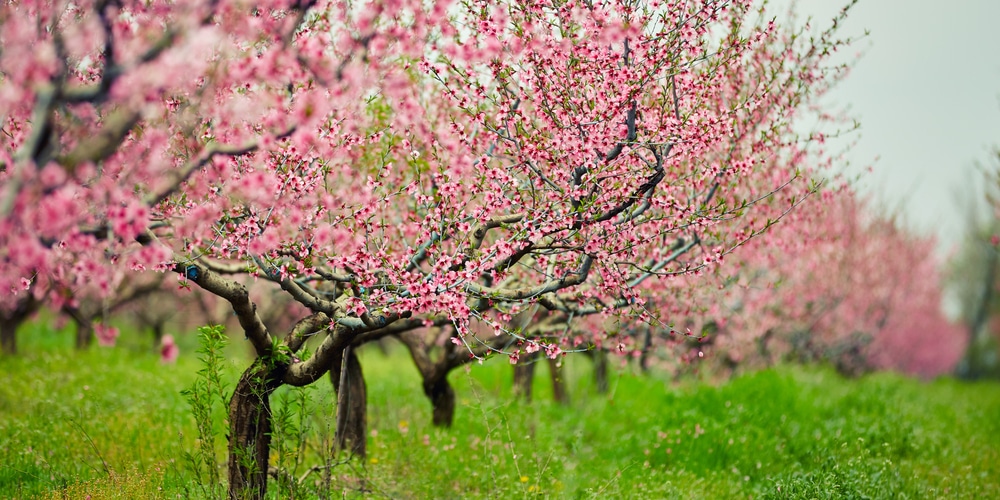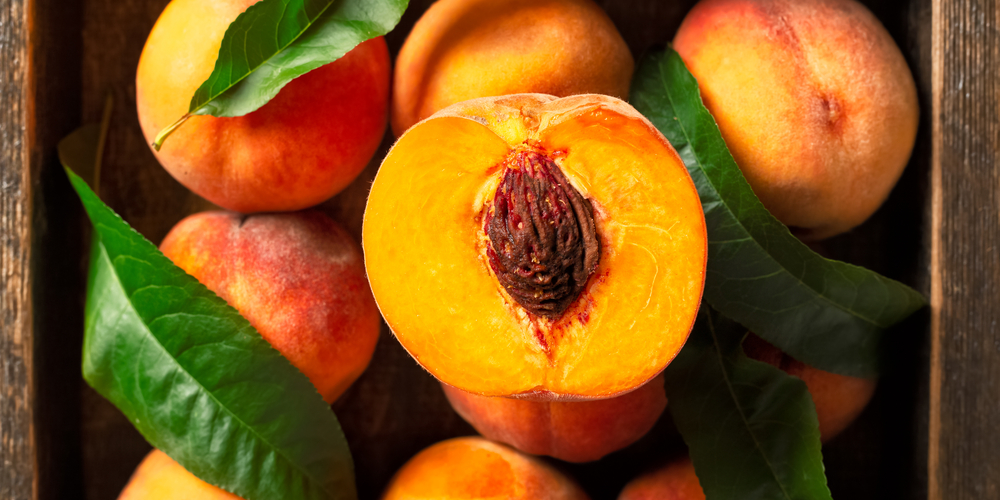Having fruit trees in your garden is never a bad idea. And if you have the conditions to grow peaches, you should consider adding this plant to your yard.
There are plenty of varieties of these fruit trees: you can find them also in dwarf sizes, perfect if you don’t have much space in your garden. Pick the species that works best in your region for the best results.
Most peaches will thrive in USDA hardiness zones between 5 and 9, but it is worth double-checking to avoid surprises.
But if you don’t live in a tropical area and can count on hot summers (and an adequate amount of chill hours), you shouldn’t have problems growing peaches in your yard. If you live in a warmer region, look for the “low-chill” varieties: they only need a couple of hundred hours of temperatures below 45F!
If you provide them with the care and attention they need, your peach trees will produce fruits for many years. You can even grow them in containers if necessary.
But what should you know about this tree? You are in the right place to find out! Here, we included all the information you should have on hand when adding a peach tree to your yard.
Does that sound like something that will benefit you? Jump to the following sections to learn all about peach trees!
When Do Peach Trees Bloom?
Before we get into our growing tips for these plants, let’s clarify this. Under optimal conditions, peaches usually bloom in the spring and produce fruits that ripen in the late summer until the early fall.
The exact dates depend on your area and the variety of peach you planted (and the care you give to this plant). The tree develops buds one year earlier. They go to dormancy in the winter and explode in the spring. But don’t forget: a tree that produces heavily won’t give you as many the following year.
You can enhance blooming by pruning your peach tree in the last few weeks of fall or early winter. So so annually to ensure your plant focuses its energy on development.
Eliminating broken or unhealthy branches will provide adequate airflow (which will minimize the appearance of pests and diseases) and strengthen your plants. And removing older growth will encourage new ones.
Of course, you should avoid overdoing it: never prune more than one-third of the tree to avoid exposing your plants to too much stress.
Also, fertilizing your tree might boost fruit production and ensure blooming earlier in the year. Start feeding your peach trees in the early spring (before the blooming season).
Doing so will allow your plants to absorb all of the nutrients they need before the heat arrives. Use a low-nitrogen slow-release product for best results.
Applying a fertilizer high in nitrogen might result in a lush tree without many fruits. But be patient: it might take a couple of years for your peach tree to start giving you crops! The wait will be worth it in the end!
Peach Tree Care: Our Tips
Plant your peach tree in late winter or early spring to allow it to establish before the summer arrives. The best part about growing peaches is that these trees are self-fertile, meaning they don’t need other peach trees around to produce fruits. But if you want to plant more than one, don’t forget to space them at least 18 feet apart.
Ensure you pick a location that receives plenty of sunlight. Without it, these trees will lose vigor and might not grow as effectively. Plus, inadequate lighting can make them susceptible to infections and diseases.
The soil should be fertile and well-draining. If you live in a hot region, mulch around the base of your tree: it will help maintain moisture for longer. It can also keep weeds under control and improve drainage.
If you get harsh winds, ensure you protect your tree from them.
These plants need constant moisture to thrive, especially during the first years of their life, when they need to establish themselves in a new environment.
Follow a regular watering schedule to ensure they get all they need to grow. Of course, overwatering is never a good idea: it might result in root rot and cause severe damage to your plants.
Related Article: Growing Peach Trees in Zone 9


